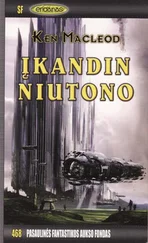Ken Macleod - The Sky Road
Здесь есть возможность читать онлайн «Ken Macleod - The Sky Road» весь текст электронной книги совершенно бесплатно (целиком полную версию без сокращений). В некоторых случаях можно слушать аудио, скачать через торрент в формате fb2 и присутствует краткое содержание. Год выпуска: 1999, ISBN: 1999, Издательство: Orbit, Жанр: Фантастика и фэнтези, на английском языке. Описание произведения, (предисловие) а так же отзывы посетителей доступны на портале библиотеки ЛибКат.
- Название:The Sky Road
- Автор:
- Издательство:Orbit
- Жанр:
- Год:1999
- ISBN:1-85723-755-2
- Рейтинг книги:3 / 5. Голосов: 1
-
Избранное:Добавить в избранное
- Отзывы:
-
Ваша оценка:
- 60
- 1
- 2
- 3
- 4
- 5
The Sky Road: краткое содержание, описание и аннотация
Предлагаем к чтению аннотацию, описание, краткое содержание или предисловие (зависит от того, что написал сам автор книги «The Sky Road»). Если вы не нашли необходимую информацию о книге — напишите в комментариях, мы постараемся отыскать её.
The Sky Road — читать онлайн бесплатно полную книгу (весь текст) целиком
Ниже представлен текст книги, разбитый по страницам. Система сохранения места последней прочитанной страницы, позволяет с удобством читать онлайн бесплатно книгу «The Sky Road», без необходимости каждый раз заново искать на чём Вы остановились. Поставьте закладку, и сможете в любой момент перейти на страницу, на которой закончили чтение.
Интервал:
Закладка:
This particular cluster of accommodation huts was in two rows of ten, with the rutted remains of a twenty metre-wide paved road between them. A gang of a dozen men was engaged in repairing the road; the breeze carried a waft of sweat and tar. The men were using shovels, a gas burner under a tipping-and-spreading contraption, and a coughing diesel-engined road-roller: primitive, heavy equipment. On the sidewalk a blue-suited Mutual Protection guard lounged, picking his teeth and apparently watching a show in his eyes and hearing music or commentary in his ears.
The loom of Myra’s shadow made him jump, blink and shake his head with a small shudder. He started to his feet.
“No need to get up,” Myra said unkindly. “I just want to speak to some of the men.”
“They’re on a break, Citizen,” he said, squinting up at her. “So it’s up to them, right?”
“Right,” said Myra. Physical work counted as recreation. It was the intellectual labour of design and monitoring that taxed the convicts’ nerves.
She turned to the men, who waved to her and shouted greetings and explanations: she’d have to wait the few minutes it would take for them to finish spreading and rolling some freshly poured tarmac. Not offering one to the guard, she lit a Marley and let the men take their time finishing their break. She’d always insisted that her arrivals and inspections counted as work-time for the labourers.
Her spirits lifted as the Virginia and the Morocco kicked in. The labourers had their yellow suits rolled down to the waist, and were sweating even though the temperature had just climbed above freezing. Most of them were younger—let’s face it, far younger—than herself; dark-tanned Koreans and Japanese, muscular as martial arts adepts—which, indeed, some of them were. She enjoyed watching them, the effect of smoke amplifying the underlying undertone of lust, the happy, hippy hormonal hum…
But that reminded her of Georgi, and her mood crashed again. Georgi was dead. Sometimes it seemed every man she’d ever fucked was dead; it was like she carried a disease: Niall MacCallum had died in a car crash, Jaime Gonzalez had died—what?— seventy years ago in the contra war, Jon Wilde had died in her arms on the side of the Karaganda road (on snow that turned red as his face turned white), and now Georgi Davidov had died in the consulate at Almaty, of a heart attack. (They expected her to believe thai?)
There had been others, she reminded herself. Quite recent others. It wasn’t every man she’d ever fucked who was doomed, it was every man she’d ever loved. There was only one exception she knew of. All her men were dead, except one, and he was a killer.
Even, perhaps, Georgi’s killer. Fucking heart attack, my ass! It was one of their moves, it had to be—a move in the endgame.
A door banged open somewhere and the street suddenly swarmed with children pelting along and yelling, their languages and accents as varied as the colours of their skins. Few of the camp’s bonded labour-force were women, but many of the men had women with them; there was every inducement for the prisoners to bring their families along. It was humane, but politic as well: a man with a woman and children was unlikely to risk escape or revolt.
Surrounded by children calling to their fathers, poking fingers in the hot asphalt, crowding around the machines and loudly investigating, die gang knocked off at last, leaving the guard to mind the newly tarred road. Myra savoured his disgruntled look as she crushed the filter roach under her heel and stepped out into the centre of the untarred part of the street.
“Hi, guys.”
They all knew who she was, but the only ones among them she recognised were two members of the camp committee, Kim Nok-Yung and Shin Se-Ha. The former was a young Korean shipyard worker, stocky and tough; the latter a Japanese mathematician of slender build and watchful mien. Kim seized her hand, grinning broadly.
“Hello, Myra.”
“Good to see you, Nok-Yung. And you, Se-Ha.”
The Japanese man inclined his head. “Hi.” He insisted on taking her saddlebags. The whole gang surrounded her, flashing eyes and teeth, talking to each other and to her without much regard for mutual comprehension. They shooed away the children and led her into the nearest hut. Its doorway film brushed over her, burst in a shower of droplets with an odour of antiseptic, and reformed behind her. She blinked rapidly and shrugged out of her heavy coat, throwing it on to one of a row of hooks that grew from the curving wall.
Her first deep breath was evidence enough of how effective the filter film was at keeping out the dust. At the same time, it brought a flush to her skin as her immune system rushed to investigate whatever she’d just inhaled of the nanoware endemic to the building’s interior. She followed Kim into the dining-area, an airy space of flat-surfaced furnishings—some a warning red to indicate that they were for heating, others white for eating off. The chairs were padded black polycarbon plastic. Around the walls, racked on shelves or stacked on floors, were thousands of books: centuries’ worth of classics and bestsellers and blockbusters and textbooks, as if blown from the four winds and fetched up against these barriers. It would have been the same in any of the huts. The next most common items of clutter were musical instruments and craft equipment and products: plastic scrimshank, spaceships in bottles, elaborately carved wooden toys.
As they sat down around a table Myra felt prickly and on edge. She tugged her eyeband, a half-centimetre-wide crescent of translucent plastic, from her hair and placed it across her temples, in front of her eyes. A message drifted across her retina. “Nanoprotect56 has detected the following known surveillance molecules in the room: Dataphage, Hackendice, Reportback, Mercury, Moldavian. Do you wish to clean up?”
She blinked when the cursor stopped on the Proceed option, took a deep breath, held it until her lungs were burning, then exhaled. The faces around the table were incurious and amused.
“Cleanup in progress,” the retinal display reported. Myra took a deep breath. It felt cool this time, as well as smooth.
“So we have privacy,” one of the Koreans said, with heavy irony.
“Ah, fuck it,” Myra said. “Happens every time. You gotta assume they’re listening.” There was bound to be something else her current release of ’ware wasn’t up to catching: she imagined some tiny Turing machine ticking away, stitching sound-vibrations into a long-chain molecule in the dirt She took a recorder—larger and less advanced than the one in her mental picture—from her pocket and laid it on the table. “And I’m listening. So, what have you got for me?”
A quick exchange of glances around the table ended as usual with Kim Nok-Yung accepted as the spokesman. He rustled a paper from an inner pocket and ran a finger down the minutes; Matters Arising started with the routine first question.
“Any progress on POW recognition?”
Myra was touched by the note of hope with which he asked the question, the hundredth time no different from the first. She compressed her lips and shook her head. “Sorry, guys. Red Cross and Crescent are working on it, and Amnesty. Still no dice.”
Nok-Yung shrugged. “Oh well. Please make the standard protest.”
“Of course.”
As they ticked their way down the list of complaints and conditions and assignments and payments, Myra noticed that the whole pattern of production in the camp had changed. The intensity of the work, and the volume of output, had gone up drastically. Twenty engines and a hundred habitat modules completed for Space Merchants in the past month! Nok-Yung and Se-Ha were subtly underlining the changes with guarded glances and shifts in tone, but they weren’t commenting explicitly.
Читать дальшеИнтервал:
Закладка:
Похожие книги на «The Sky Road»
Представляем Вашему вниманию похожие книги на «The Sky Road» списком для выбора. Мы отобрали схожую по названию и смыслу литературу в надежде предоставить читателям больше вариантов отыскать новые, интересные, ещё непрочитанные произведения.
Обсуждение, отзывы о книге «The Sky Road» и просто собственные мнения читателей. Оставьте ваши комментарии, напишите, что Вы думаете о произведении, его смысле или главных героях. Укажите что конкретно понравилось, а что нет, и почему Вы так считаете.











